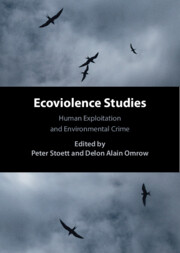Book contents
- Ecoviolence Studies
- Ecoviolence Studies
- Copyright page
- Contents
- Contributors
- Foreword
- Foreword
- Preface and Acknowledgments
- 1 Ecoviolence Studies and Human Security
- 2 The Links between Human Trafficking and Wildlife Trafficking
- 3 Preventing a Secondary Disaster: How Emergency Management Agencies Can Prepare and Respond to Disaster-Linked Exploitation
- 4 Ecoviolence at Sea
- 5 There Will Be Blood: The Return of the Frontier Logic in Guyana and Hyper-Exploitation in the Mining Sector
- 6 Artisanal Gold Mining in Uganda: Towards Formalization as Remediation of Dignity and Rights
- 7 Searching for Shelter in the Climate Crisis Era: Ecocide and Migration
- 8 Climate Change, Violence and Ecocide
- 9 Sea of Cortez Region: Crime and Ecosystem Crossroads
- 10 Minority Languages as Collateral Damage in the Climate Crisis: The Incidental Result of Ecoviolence on Y Gymraeg/Welsh Language
- Index
- References
10 - Minority Languages as Collateral Damage in the Climate Crisis: The Incidental Result of Ecoviolence on Y Gymraeg/Welsh Language
Published online by Cambridge University Press: 13 February 2025
- Ecoviolence Studies
- Ecoviolence Studies
- Copyright page
- Contents
- Contributors
- Foreword
- Foreword
- Preface and Acknowledgments
- 1 Ecoviolence Studies and Human Security
- 2 The Links between Human Trafficking and Wildlife Trafficking
- 3 Preventing a Secondary Disaster: How Emergency Management Agencies Can Prepare and Respond to Disaster-Linked Exploitation
- 4 Ecoviolence at Sea
- 5 There Will Be Blood: The Return of the Frontier Logic in Guyana and Hyper-Exploitation in the Mining Sector
- 6 Artisanal Gold Mining in Uganda: Towards Formalization as Remediation of Dignity and Rights
- 7 Searching for Shelter in the Climate Crisis Era: Ecocide and Migration
- 8 Climate Change, Violence and Ecocide
- 9 Sea of Cortez Region: Crime and Ecosystem Crossroads
- 10 Minority Languages as Collateral Damage in the Climate Crisis: The Incidental Result of Ecoviolence on Y Gymraeg/Welsh Language
- Index
- References
Summary
This chapter focuses on the impact of ecoviolence – in particular, climatic uncertainty – on the language and culture of three areas within the Northwest Wales Coastline and within the county of Gwynedd. These are considered the Cadarnleoedd y Gymraeg. The Cadarnleoedd is often contested as a political tool rather than a formally recognised linguistic or cultural territory, as is the Gaeltacht in Ireland and the Gaidhealtachd in Scotland. Here, it is used to describe the areas in Wales where the Welsh language is strongest, with at least 50 per cent of the population able to speak it. There has been a consistent decrease in the number of people able to speak Welsh in Wales, which is challenging the sustainability of the language in its traditional heartlands.
- Type
- Chapter
- Information
- Ecoviolence Studies , pp. 170 - 182Publisher: Cambridge University PressPrint publication year: 2025

